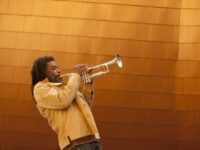Just as her image is suitable for a twenty dollar bill, Harriett Tubman’s name on music better be on music that suitably befits her legacy. The powerful music of Harriet Tubman, the three piece band, does. Harriett Tubman honors its namesake by thriving in danger, confronting all challenges head-on and bucking hard against preconceptions and custom.
When Brandon Ross, Melvin Gibbs and JT Lewis set out in 1998 to further the sonic revolutions of the likes of Jimi Hendrix, Ornette Coleman, P-Funk and the Art Ensemble of Chicago, they might not have anticipated it but the ideas they set forth then remain vital nearly twenty years later. Given the current state of affairs, perhaps even more so. Leastwise, that’s the upshot of their newest Harriet Tubman LP Araminta (February 24, 2017 Sunnyside Records), which benefits from a huge assist from a large figure in avant-garde: Wadada Leo Smith.
Guitarist Ross had been a member in Smith’s Organic Resonance ensemble, making contributions on Spiritual Dimensions and Heart’s Reflections; he’s also worked with such diverse names as Henry Threadgill, Cassandra Wilson, Jewel, Muhal Richard Abrams, Archie Shepp, Lizz Wright, Me’Shell N’degeocello, Tony Williams, and The Lounge Lizards. Gibbs brings a sizeable amount of cred, too, having lent his bass skills to the Rollins Band, DJ Logic, Arto Lindsay, Power Tools and Defunkt. Lewis has drummed with Living Colour, Dave Sanborn, Stanley Jordan, Sting, Lou Reed, Herbie Hancock, Lou Reed, Tina Turner, Whitney Houston, Threadgill, David Murray, and Bill Laswell, just to name a few.
Named after Tubman’s birth name, Araminta is raw and compelling, liberally tossing jazz, funk, rock, dub and a little electronica into a murky sonic stew. To laymen like you and I, these songs seem like hard-hitting impulses, but there’s a method to this madness. The music isn’t notated, the four stitch compositions together from fragments and follow Smith’s convention of fabricating sound around space and intensity (the “concentration of activity”). This is how the music sounds so free but also so tuneful and purposeful. Producer Scotty Hard puts on the crucial finish touches on the raw recordings.
In fact, the whole notion of making music from quasi-fractal geometric developments is the idea behind the free-dub performance of “Blacktal Fractal,” where there’s a lot of spontaneity going on sprung from a seven-note bass figure but there’s also a high degree of band telepathy. Gibbs’ imposing bass heralds the start of the album and “The Spiral Path To The Throne,” as initial wails from him, Ross and Smith settles into a uneasy groove where the latter two have a spiritual conversation. Smith is in peak form with an authoritative trumpet storm over Gibbs’ satanic fuzz bass on “Ne Ander,” and Gibbs later moves up front to make even more hay.
“President’s Obama’s Speech At The Selma Bridge” is a headlong plunge into free jazz, the trumpet and guitar unifying and diverging for dark statements and the rhythm section churning below suggesting an upheaval. At one point, Gibbs’ super distorted bass is left alone with the drums, leaving us to ponder the aftermath. Smith’s horn pierces through a dub haze like a spear on the highly atmospheric “Nina Simone” as Ross adds splotches of feedback to complete the abstract aural painting.
Clocking in at a brisk three minutes, the Smith-less “Taken” is dominated by Ross’ overdriven guitar but behind him is a clash of tempos between Lewis and Gibbs. Also down to the base trio, “Real Cool Killer” brandishes a real cool rhythm from Lewis and Ross stirs up tumult as Gibbs’ repeating pattern forms the riff at the center of this song. The simple but soul-laden bass riff with Ross’ guitar meditating sensitively around it make “Sweet Araminta” the perfect, poetic sendoff.
In what will likely go down as one of the best fusion experimental improvised music uncategorizable releases of the year, Araminta is a swaggering statement from four musicians who thrive on taking chances.



